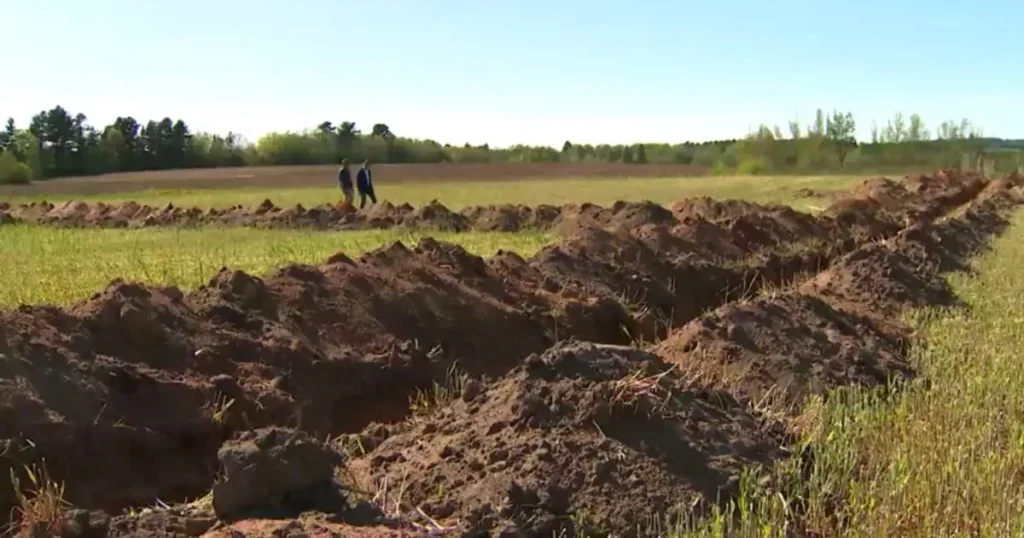The ongoing drought in Atlantic Canada has raised significant concerns for the region, as severe dryness continues to affect local ecosystems and communities. Recent reports from Environment Canada highlight the alarming increase in wildfire risk across the eastern provinces, prompting swift action from governments. In Nova Scotia, burn bans are strictly enforced, with offenders facing exorbitant fines, reflecting the urgency of the situation. Meanwhile, New Brunswick has enacted forest closures to mitigate the danger, further limiting public access to nature. As conditions worsen, the threat of wildfires looms large, with fire-related penalties becoming a focal point of provincial efforts to protect the environment and public safety.
Amidst the worsening situation in Atlantic Canada, the region grapples with a significant dry spell that has progressively elevated concerns about natural disasters, particularly wildfires. The current moisture deficit has led to complete shutdowns of wooded areas in provinces like Nova Scotia and New Brunswick, drastically restricting public activities such as camping and fishing. These preventive measures, coupled with stringent burn restrictions, underscore the critical need for safety in light of potential fire hazards. As residents adjust to these limitations, the channels for reporting violations and the potential consequences of ignoring fire bans have become increasingly vital pieces of communication from local authorities. The pressing nature of these protective regulations illustrates the seriousness with which Atlantic Canada is confronting unprecedented environmental challenges.
Understanding the Atlantic Canada Drought Crisis
The ongoing drought in Atlantic Canada has become a pressing issue, drawing the attention of both environmentalists and residents. With consistent reports from Environment Canada indicating a lack of rainfall, this dire situation has heightened concerns about water scarcity and its impact on the region’s ecosystems. The absence of precipitation not only affects agricultural output but also intensifies the vulnerability of natural landscapes to wildfire outbreaks, escalating the urgency for preventative measures.
Local authorities are actively monitoring drought conditions, which are expected to persist unrelentingly in the coming weeks. This prolonged dry spell is alarming, particularly among communities that rely heavily on agriculture and forestry. The critical nature of the drought underscores the need for residents to stay informed about local resources and the potential implications for their day-to-day lives.
Wildfire Risk in Atlantic Canada: Current Threats and Responses
As drought conditions continue to worsen in Atlantic Canada, the associated wildfire risk has reached an alarming level. Reports indicate that the risk of wildfires is significantly heightened, prompting various provinces to implement strict measures to mitigate potential disasters. Nova Scotia and New Brunswick’s decision to close public forests aims to prevent ignition sources in high-risk areas, safeguarding both residents and natural habitats.
Regional governments have introduced stringent regulations regarding fire-related activities, including burn bans and increased penalties for violations. In Newfoundland, the hike in fines from $50,000 to $150,000 for fire ban violations signals the government’s commitment to managing wildfire threats effectively. With active fires reported in the province, these measures are not only precautionary but essential to protecting lives and properties.
Nova Scotia’s Forest Closures and Burn Bans Explained
In a decisive move to combat increasing wildfire risks, Nova Scotia has implemented comprehensive forest closures alongside an outright burn ban. These actions reflect the dire need to safeguard the region amidst drought conditions that have rendered landscapes particularly vulnerable. Residents are prohibited from engaging in outdoor burning activities, with penalties reaching up to $25,000 for violations, emphasizing the seriousness of compliance.
The burn ban specifically prohibits recreational fires, including cooking and warming fires, in open areas. This restrictive measure has drawn some public criticism; however, authorities justify it as a necessary step to minimize wildfire threats that could devastate local communities. These closures not only protect human life but also the biodiversity of Nova Scotia’s forests, which are susceptible to fire damage.
New Brunswick’s Forest Closures: Impacts and Guidelines
Following the rising concerns regarding the wildfire risk, New Brunswick has taken significant steps by closing all Crown lands to the public. This includes strict restrictions on access to wooded areas, leading to the cancellation of outdoor activities, such as fishing, camping, and hiking. The government has outlined these guidelines to ensure safety, particularly as the drought worsens and fire risks escalate.
These closures have led to considerable disruptions in the leisure activities that many local residents look forward to, especially during the summer months. However, authorities stress that these measures are vital for preventing potential wildfires, which could result in catastrophic losses, such as those experienced in previous years. Ensuring collective compliance with these restrictions can significantly reduce the likelihood of fire-related incidents throughout the province.
Fire-Related Penalties: Newfoundland’s Tough Stance
In Newfoundland, the government has responded to the escalating wildfire crisis by dramatically increasing penalties associated with violating fire bans. For offenders, the introduction of fines up to $150,000, alongside the possibility of imprisonment, reflects the seriousness with which authorities are treating these fire-related offenses. Such stringent measures aim to deter irresponsible behavior that could lead to catastrophic wildfire events.
The current situation, with three major wildfires active in the province, emphasizes the need for prompt and decisive action. Premier John Hogan’s statements regarding the urgency of compliance with fire regulations are backed by the potential threat to communities and natural resources. These elevated penalties serve as a wake-up call, urging the public to recognize their role in preventing wildfires during this perilous drought period.
The Importance of Reporting Wildfire Violations
As part of the collective effort to mitigate wildfire risks, authorities in Nova Scotia have encouraged citizens to actively report any instances of violations against burn restrictions. A dedicated government hotline has been established to facilitate this reporting process, allowing residents to contribute to fire safety in their communities. The initiative highlights the critical role of community involvement in managing wildfire threats effectively.
With increasing fines and penalties imposed on those who disregard fire-related regulations, public vigilance becomes an essential component of wildfire prevention strategies. As recorded by the Nova Scotia RCMP, numerous tickets have already been issued this year, indicating the widespread need for adherence to fire safety protocols. Engaging the community in reporting helps reinforce responsibilities and create a sense of shared accountability in protecting valuable resources.
Seasonal Wildfire Preparedness: Lessons from Prior Years
In light of the escalating drought and wildfire risks, reflecting on prior experiences can provide valuable insights for seasonal wildfire preparedness. The devastating fires of 2023, which obliterated homes and transformed landscapes, serve as a grim reminder of the catastrophic potential of wildfires. Consequently, preparing for forthcoming seasons involves assessing risk factors and implementing proactive measures to safeguard communities.
Residents are encouraged to stay informed about local fire restrictions, participate in community preparedness programs, and familiarize themselves with emergency evacuation plans. Understanding the history of wildfire impacts within the region, alongside current meteorological conditions, can enhance individual and collective readiness to combat potential threats posed by droughts and wildfires in the future.
The Role of Community in Fire Safety Efforts
As wildfire risks intensify in Atlantic Canada, the role of community engagement becomes increasingly vital in the fight against potential devastation. Local organizations, community groups, and individuals are urged to collaborate and promote fire safety education among residents. Initiatives focused on amplifying awareness regarding safe practices during dry conditions can significantly contribute to minimizing wildfire incidents.
Furthermore, community members are encouraged to participate in local firefighting drills and educational seminars to better understand fire safety protocols. Establishing a well-informed community can enhance vigilance towards fire-related uncertainties and foster a sense of collective responsibility to protect the environment and local ecosystems during drought conditions.
Navigating Restrictions: What Residents Should Know
With a series of restrictions in place amidst the ongoing drought and wildfire threats, it is crucial for residents of Atlantic Canada to navigate these measures effectively. Understanding the specifics of burn bans and forest closures enables individuals to make informed decisions on recreational activities while adhering to safety protocols. Staying updated through official channels can help mitigate any confusion regarding these restrictions and their rationale.
Moreover, it is advisable for residents to engage with local authorities to clarify any doubts about permitted activities during this critical period. Communication between the public and government agencies is essential in ensuring compliance and promoting a unified approach to wildfire prevention, ultimately safeguarding lives and properties from the adverse impacts of drought.
Looking Ahead: Future Trends in Wildfire Management
As Atlantic Canada continues to grapple with increasing wildfire risks due to climate change and enduring drought conditions, it is imperative for policymakers and communities to look ahead in wildfire management strategies. Future trends may involve enhanced legislative measures, improved community involvement in fire preparedness, and heightened public awareness campaigns aimed at fostering responsible behavior during high-risk periods.
Embracing innovative technologies like advanced weather forecasting and early warning systems can also play a significant role in transforming the approach towards wildfire management. Engaging stakeholders at all levels will be vital in developing adaptive strategies that not only address current challenges but also seek to mitigate the impacts of future drought and wildfire incidents.
Frequently Asked Questions
What impact has the Atlantic Canada drought had on wildfire risk?
The ongoing Atlantic Canada drought has significantly increased the wildfire risk across the region, prompting authorities to implement strict measures to mitigate potential disasters. The dry conditions have created an environment highly susceptible to wildfires, particularly in provincial areas like Nova Scotia and New Brunswick.
Are there any burn bans in effect due to the drought in Atlantic Canada?
Yes, there are comprehensive burn bans in effect across Atlantic Canada due to the drought. Nova Scotia has an outright burn ban, allowing no open flames outside of designated campfires. New Brunswick has similar restrictions, advising residents to avoid wooded areas completely.
How have Nova Scotia wildfires influenced public forest access during the drought?
The recent Nov Scotia wildfires, exacerbated by the drought, have led to the closure of all public forests in the province. This measure is meant to protect both residents and the environment, given the heightened risk of wildfires under current dry conditions.
What measures are being taken in New Brunswick regarding forest closures and the drought?
In New Brunswick, all crown lands have been closed due to the drought and associated wildfire risk. This means that outdoor activities like fishing, camping, and hiking are prohibited, with increased fines for violations to ensure compliance with public safety measures.
What are the penalties for fire-related offenses during the Atlantic Canada drought?
During the Atlantic Canada drought, penalties for fire-related offenses have been intensified. In Newfoundland, fines for violating fire bans have increased from $50,000 to $150,000, with possible imprisonment for offenders. Nova Scotia similarly imposes hefty fines of $25,000 for burn ban violations.
How are communities responding to wildfire risks amidst the Atlantic Canada drought?
Communities are responding to the elevated wildfire risks due to the Atlantic Canada drought by adhering to fire bans, reporting violations, and staying informed on safety measures. Authorities are actively ticketing violators, and public education campaigns are ongoing to highlight the importance of preventing wildfires.
What has the provincial response been to the escalating wildfire threats in Atlantic Canada?
Provinces like Nova Scotia, New Brunswick, and Newfoundland have adopted strict forest closures and intensified penalties for fire-related violations in response to escalating wildfire threats attributed to the drought conditions. These actions aim to protect both the environment and public safety.
Are there any additional restrictions in place for outdoor activities in Atlantic Canada due to the drought?
Yes, additional restrictions are in place for outdoor activities across Atlantic Canada due to the drought. For example, in Prince Edward Island, burn permits have been revoked entirely, allowing fires only for warmth or cooking, to mitigate further wildfire risks.
How has the Atlantic Canada drought affected public feedback regarding forest closures?
The Atlantic Canada drought and ensuing forest closures have generated public feedback, with some residents in Nova Scotia criticizing the blanket bans on forest access as disproportionate. Advocacy groups like the Canadian Constitution Foundation have raised concerns about the breadth and enforcement of these regulations.
What historical context contributes to the current wildfire risks in Atlantic Canada?
The current wildfire risks in Atlantic Canada, intensified by drought, draw from historical context where devastating wildfires in regions like Nova Scotia have occurred in previous years, notably 2023. This recurring pattern highlights the connection between drought conditions and rising fire-related threats.
| Aspect | Details |
|---|---|
| Drought Conditions | Ongoing drought impacting Atlantic Canada with no relief expected soon. |
| Wildfire Risk | Heightened risk across Eastern Canada, prompting serious responses from provinces. |
| Nova Scotia Measures | Burn ban in effect; fines up to $25,000 for violators. |
| New Brunswick Measures | All Crown lands closed, advisories against entering wooded areas. |
| Newfoundland Measures | Fines raised to $150,000 for fire ban violations; possible prison time. |
| Prince Edward Island Measures | Restrictions on fires except for warmth and cooking; burn permits revoked. |
| Previous Incidents | Past wildfires in 2023 caused significant damages, with concerns raised about current policies. |
| Enforcement Actions | Tickets issued for violations; fines exceeding $288,000 recorded in Nova Scotia. |
| Future Risks | Restrictions likely to last until late fall; ongoing clarification of measures needed amidst high risks. |
Summary
The Atlantic Canada drought has led to severe wildfire risks across the region, prompting unprecedented restrictions from provincial governments. Measures such as burn bans, forest closures, and increased fines reflect the urgency of the situation, as communities aim to protect both human lives and ecosystems. Past experiences with destructive wildfires underscore the necessity of these precautions, with authorities emphasizing the importance of compliance and public awareness in mitigating risks. As the drought conditions persist, residents are urged to remain vigilant and adhere to the new regulations to safeguard Atlantic Canada from potential disasters.



